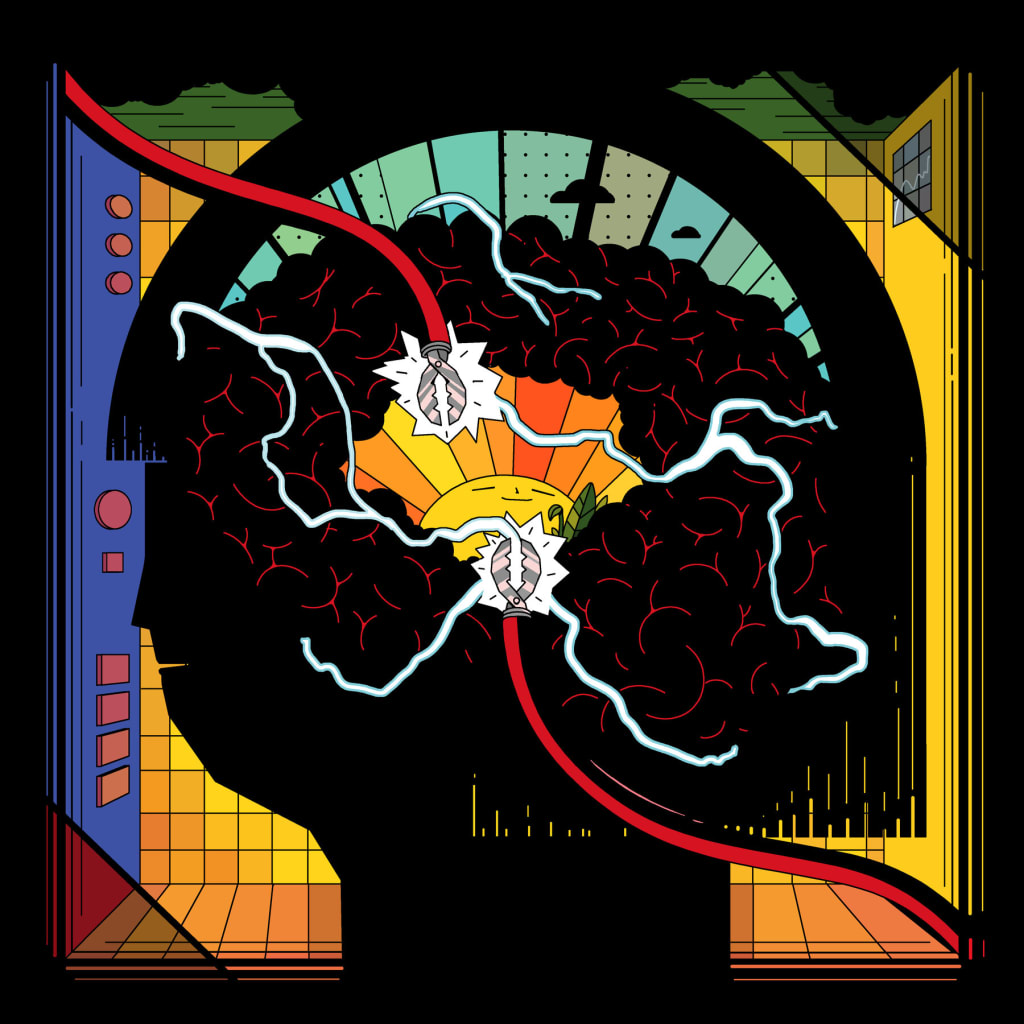Your Brain on Life
Hacking, Harnessing and Honing it!

Inspirational words come from those who have experienced suffering.
Inspiration comes from a place where you had to keep going and felt like you couldn't. We've all been there… in some way, struggling against our own thoughts and narrative to find a better way, to persist in the face of adversity.
It's these painful experiences that we share within humanity that are so extremely relatable, we feel that the author has peeked into our own lives and written the words just for us, for the terrible thing we are going through, or have just come out of.
It is the writer who can take these experiences and convey them to the world in a meaningful way for others.
It is up to us to pick our words so well, that you FEEL what is behind them so deeply, that you awaken to a truth that was always true…
- That you are not alone.
- That this too shall pass.
- And that another tomorrow shall follow no matter how hard it feels right now.
Inspirational words come from a universal understanding of suffering and the will to overcome it.
We are incredibly willful creatures… human beings.
And we are so clever at creating suffering.
Illusions are something we seem impeccably good at perfecting. After all, what is real? It's all happening in your own head anyway… Said Dumbledore from Harry Potter.
Does that make it real? Not always. But it also doesn't make it hurt any less.
As a writer I like to get down to the core of what we are all experiencing, especially suffering! I want to find out why we are, when we suffer most and how to move beyond that place back into a sense of normal we can live with. I also want to convey it to my readers so they understand themselves and how they can move through these challenges KNOWING that there is a tomorrow on the horizon of painful experiences.
I’ve been learning a lot about Neuroplasticity. It’s a weird word and makes me think of playdough for some reason. Taffy is another image my brain conjures to classify this concept. We categorize and classify everything. Everything… it’s in our genetic makeup because we needed to be able to survive.
What happens when you don’t have to focus on survival in your everyday life? What happens when you no longer have to work in the same physical capacity to gather food, supplies and resources based on cyclical rhythms?
Well, a lot actually.
I’ve included an incredible TED talk video that explains exactly what is happening in your brain and your life, engrossed in your own suffering.
Our thoughts are everything. Our environment is critical and our habits really solidify our lifestyle. We can make a life we love, or something that leads to our personal destruction.
Rewiring our minds is not hard, it just takes practice. It takes habit forming in alternative ways than we are used to, and it takes consistency.
We need challenges. As humans, we’ve evolved to move away from challenge and pain. But… We all find ourselves in painful situations and don’t know why.
It’s about getting out of our comfort zone. I know. You’ve heard of that before right? We all have. Do we really understand what that means outside of being a fancy, hyped up term that the media uses to describe what’s familiar?
NOPE.
Our comfort zone is the accumulation of connections in our brain that make life easy to automate.
We need to make new connections in the brain so we remain alert, learning and growing into more resilient people. The comfort zone is the place we live when we become familiar with our daily routines and the practices we act on.
So, basically we get into a groove. Now that SOUNDS like a good thing… but bear with me as I lay out the dangers of this groove.
While it can be helpful when you need to do a job properly every time and remember what needs to be done and when. It can be detrimental when we need to adjust to a new situation or uncomfortable circumstances that occur in our lives. Automation has its place but adaptability is fundamental to help our species move forward. This is called resilience.
It is astounding to see the statistics regarding children and resilience. This is also attached to shame and guilt.
But we don’t talk about that in civilized society. Kinda like cancer in the 70’s when people would whisper it in one another’s ears like it was going to attack them if they spoke to it like it was something we had power over.
We give power to the things that we don’t speak about.
Read that again.
WE GIVE POWER TO THE THINGS THAT WE DON’T SPEAK ABOUT.
This is where our suffering lives. This is why suicide is an epidemic. This is why depression and anxiety is on the rise in our youth. This is also why we need to have more conversations about it.
Shame and guilt create neural pathways in the brain just like everything else we experience.
Basically, we just don’t know what we DON'T KNOW. Our modern day life is set up to keep us busy, multitasking and working with all the hats we wear to make our world go round. Do we have time to learn new things? Yeah… Do we? Not always. It’s become far too easy to get into grooves that don’t actually support us.
Studies with rats have given us mind blowing clues into the reward systems our brain use to move us through the world. (See Video Below)
We are designed to seek reward and pleasure. But what many people don’t know is that we are all designed for MOVEMENT! These are connected in profound ways that affect our lives that we never really think about.
Why?
Well, because it’s an automation. It’s part of the brain that we don’t need for consciously moving through the world. It’s the part of the brain that functions regardless of what we are doing. Now, here’s where it really gets interesting to me. When we do tasks that are connected to movement and reward, we gain more meaning in our lives.
Wait WHAT?
Really, How can that be?
We are so used to sitting in front of our screens and focusing on how we can get “down time” and relax, and work less, not more. This is a powerful insight on why the challenges we face and the multitasking aspect of our modern daily life is creating grooves in our brains that are contrary to what we need in order to be the most happy, the most fulfilled and the get most meaningful experiences we can.
I’ve heard that the meaning you have in life is what you make of it.
I’m reconsidering that phrase the more I learn about this.
I am coming to understand that meaning has more to do with pairing movement to reward. We need to take pride not only in the things we are doing, but in HOW we are doing them. Behavior is important to mental health. Who would have thought? Behavior is the habit formed lifestyle we create through our worldly movements.
- We go to our jobs and we hate it.
- We raise families and get stressed out, and complain.
- We get rageful in traffic that we have no control over.
- We seem to want things that we don’t have and blame others for US not having them.
There are too many places in our daily lives where our behavioral habits are killing us! Literally.
“Your brain will give you exactly what it thinks you want.”
-Marissa Peers
You say: Oh, I wish I had a week off work so I could lay in bed all day and relax!
Your brain then makes decisions to make that happen for you by saying: You need time off! I’m brilliant at that. Here, let me give you the flu! Now you can stay home, lay in bed and relax and you don’t have to go to work because you hate it and don't want to be there.
That single example is a great way to see the difference in how we unconsciously think things which manifest themselves in ways that are detrimental to our wellbeing.
Who knew?
So, resilience is built on movement and reward, behavioral habits, and understanding exactly how your brain will give you exactly what you ask it for. Resilience is something they talk about in shame and guilt research.
"Sometimes we have to do tough things and feel our way through tough situations, and we have to feel tough emotions."
-Brene Brown
Doing tough things creates new grooves in the brain. This is neuroplasticity that I mentioned earlier. This is the power of our minds' ability to adapt to an environment through adversity. This is also resilience. We can actually create tension in strategic places and in conscious ways to help the brain grow these new (and positive) grooves, as well as creating the kind of life that we don't feel the need to escape from.
When you practice gratitude (even for the hard things) you are literally telling your brain what you want MORE of, not less. Because the brain is not subtractive, it builds, it adds, and it multiplies exponentially.
Using our earlier example of work, let's look at it from a gratitude perspective.
Instead of saying what we did earlier, we are going to change the narrative and see how the brain responds differently.
You say: I get to go to work today! I am so grateful that I can use my time in a fulfilling way that brings me the money I need to live well.
Your brain says: You love working? Wow, ok. I am going to make sure you have ample energy for that job to the best of your ability. You also said that it's fulfilling because you get money. I am going to put you in situations where you can work better for MORE money!
See, the brain wants (again) what it thinks is best for us. We can tell the brain exactly what is best for us by changing the internal script and opening up a dialog within that is creating the kind of grooves in our lives that truly support us.
This kind of conscious mental activity has been proven in countless studies to reduce stress, anxiety and depression rates across the board by boosting resilience.
Resilience – the APA describes as:
“The process of adapting well in the face of adversity, trauma, tragedy, threats or significant sources of stress — such as family and relationship problems, serious health problems or workplace and financial stressors. It means “bouncing back” from difficult experiences.”
From the article: https://positivepsychologyom/resilience-training/
So in a nutshell, our brains are amazing! We aren’t taught how they work, and how we can use them to create the best life we can have. If more children were taught this at an earlier age, just imagine how differently they could adapt to the environmental stresses that we all face. Perhaps they could overcome adversity in a way that we never thought was possible before. It could even have a greater impact on society as a whole, as these same children grow up to be more aware of their own thoughts, rather than the likes they get on Instagram and other social media accounts.
Who knows, we could possibly change the entire world for the better, just by thinking differently about how we move through it.
Thank you for reading. If you enjoyed this article show me by doing whatever you feel compelled to. Also, check out my other article on suicide for a father, in depth conversation regarding one of the biggest problems we face in society today.
About the Creator
Dannielle Nelson
I have no taboo subjects. Buckle up & prepare for the journey! From Steampunk, reality, mental health, poetry, & eclectic philosophy. Enjoy.
I have 2 Websites where other works can be read.






Comments
There are no comments for this story
Be the first to respond and start the conversation.